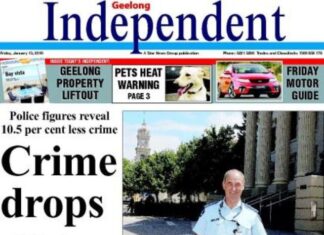Hamish Heard
Geelong will rely on bore water next year after record low annual rain forced Barwon Water to announce its harshest round of restrictions.
Barwon Water chairman Stephen Vaughan said woeful flows into West Barwon Reservoir had prompted works to boost the authority’s capacity to tap underground water.
Beefed up bores would produce 55 million litres a day from Barwon Downs borefield to supplement the region’s dwindling drinking supplies, he said.
“By autumn next year, the borefield will be supplying up to two-thirds of (the region’s) daily water needs,” Mr Vaughan said.
He denied the region was running out of water, despite reservoirs dropping from 52 per cent capacity to 26.4 per cent in the past year.
“Geelong will never run out of water,” he said.
“With the expected customer support for stage-four restrictions, groundwater from Barwon Downs borefield and rainfall similar to this year’s rainfall, the region will not run out of water.”
However, Mr Vaughan said Barwon Water faced a limit to the amount of supply it could pump from underground reserves over 10 years.
Geelong’s daily water consumption had dropped from 105 megalitres a day to about 85ML since stage three restrictions took hold at the start of November, Mr Vaughan said.
He hoped stage four restrictions from December 9 would push consumption down further.
Stage four bans watering of public or private gardens, lawns, sport grounds and any outdoor hard surfaces.
Cars can only be washed at commercial washes using alternative water sources. Car windows, lights and mirrors can be washed at home using buckets.
“The Barwon Water board recognises the impact stage four restrictions will have on every one of our customers,” Mr Vaughan said.
“However, these harsh restrictions are necessary to ensure our remaining water supplies are sufficient for essential water use.”
Mr Vaughan said 2006 had been the driest year on record in the catchment area for West Barwon Reservoir since it was built in 1965.
He said it was unlikely restrictions would ease until at least autumn next year.
Going full bore
Digital Edition
Subscribe
Get an all ACCESS PASS to the News and your Digital Edition with an online subscription
From the archives
16 years ago
15 January, 2010
Greater police presence and the introduction of new powers to tackle anti-social behaviour have led to a “significant” drop in...








